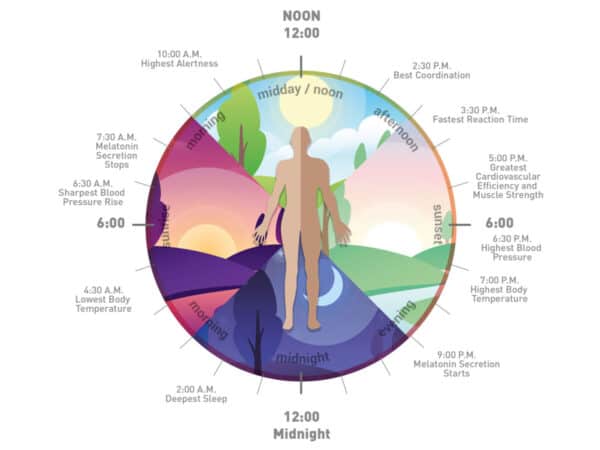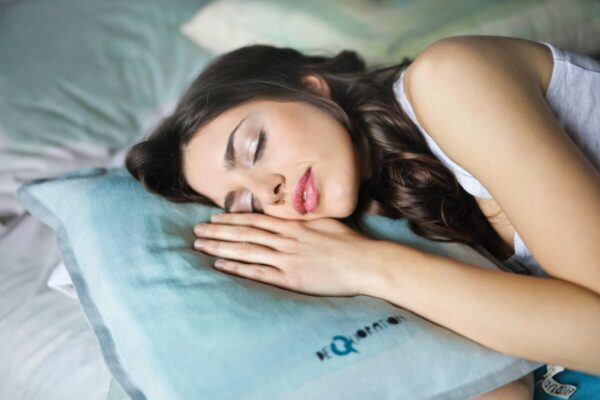Sit in a row of people and then look to your left, then to your right. Out of the three of you–the person on your left, the person on your right, and you–one of you isn’t getting enough sleep. That’s a fact according to the CDC, at least in the United States.
Why do people take a week off a work and then go sleep and relax in a resort or a hotel? Why do people often say “I need a vacation” when they think about their stress? Is it because vacations are stress-free?
Not really.
Vacations often bring their own kind of stress from packing, flight worries, or safety concerns while traveling. But there’s a reason people put up with the madness of travel. While the views and change of scenery are wonderful, those things don’t combat stress.
Sleep and relaxation do.

The required 7 hours of sleep isn’t happening for some of us. You know who you are. During difficult times in our lives, such as unemployment, mental illness, physical illness, financial problems, or other hard-to-deal with events, we can get even less sleep.
According to the CDC,
Sleeping less than seven hours per day is associated with an increased risk of developing chronic conditions such as obesity, diabetes, high blood pressure, heart disease, stroke, and frequent mental distress.
That’s some bad news, folks. So let’s turn this on its head because the term I really would rather use is “sleep health”, which can be defined as
…a multidimensional pattern of sleep-wakefulness, adapted to individual, social, and environmental demands, that promotes physical and mental well-being. Good sleep health is characterized by subjective satisfaction, appropriate timing, adequate duration, high efficiency, and sustained alertness during waking hours.
Daniel J. Buysse, MD, “Sleep Health: Can We Define It?“
Free Self-Care Cards

Not everyone can just high-tail it off to the Bahamas, so how do we get more rest in our everyday life?
Here are a few ideas:
1 – Go to bed at the same time each night
The biggest key to overcoming insomnia or balancing our circadian rhythm is to go to bed the same time every night and wake up at the same time every morning. This also means we avoid sleeping during the day. Cat naps are fine, but long naps during the day will continue to wreak havoc on our sleep at night.

Our Circadian rhythms trigger reactions in our brain for when to go to sleep and when to wake up. Light or lack of it can play a big part in this triggering, that’s why people who are blind often have sleep problems. Light entering our eye in the morning can trigger that it’s time to wake up. When the light goes away at night, our bodies are triggered to get sleepy. Keeping a consistent schedule will allow our bodies to do what they are meant to do. (Source: VeryWell)
2 – Get rid of electronics from your bedroom
Remove televisions, computers, and other devices from your sleeping area. Plug your cell phone to charge in another room, so the notifications or lighting won’t affect your sleep patterns.
Remember when I said that light plays a factor in our sleep? Well lights from phones, televisions, and other electronics can really mess up our brains and prevent us from sleeping. Looking at your phone before bed can trick your brain into thinking you aren’t supposed to go to sleep.

I had an alarm clock at one point that had lights shining from it that were preventing me from sleeping. After turning it the other direction, I didn’t have sleep problems any longer. We also removed our TV and computers (even laptops) from our sleeping area and it has improved my sleep tremendously. Don’t poo poo this tip. It really will help you sleep by following it.
It’s important to avoid looking at screens 2-3 hours before you plan on going to sleep. The more light you are taking in closer to bedtime, the harder it will be to fall asleep and stay asleep.
3 – Grab Some Sun
During the day, if you can, you should get as much natural light as you can. In Minnesota, this isn’t always possible. We have long periods where the days are dark and gloomy. It’s too cold to go outside.
Some helpful ways to combat this is by purchasing a light therapy lamp. By using the lamp for 20 minutes a day, you can assist your body in producing the chemicals it needs to know you are awake. This is helpful if you have Seasonal Affective Disorder, a condition that causes depression and sleepiness during the daytime. This lamp should be used in the morning, not at night. In addition, getting Vitamin D is also important.
4 – Create a bedtime ritual
Just like we tell our kids to follow a bedtime ritual, we need to follow one too. Maybe that means we need help calming our bodies down. This could be a bath, diffusing essential oils (the calming ones–not the ones that give you energy!), or cuddling with your fur baby or spouse. Following a routine puts our bodies into prep mode to go to sleep.
Instead of watching TV or looking at your phone before bed, try reading a book, drawing, or doing something that doesn’t require screens and light. One idea is to keep a notebook next to your bed and do a “brain dump”. This helps you relax by writing down all the stresses and problems of the day so they aren’t swirling around your mind while you sleep.
5 – Use essential oils to promote sleep
I mentioned this above, but it’s worth mentioning again. There have been studies done that have proven essential oils are beneficial for mild sleep issues. Here’s a brief list of some oils that support healthy sleep:
Lavender is one of the most used oils for sleep. It has many uses, which you can read about here, but sleep is a major one.
6 – Keep the Room Clean and Cool
Keeping your bedroom at a cooler temp will allow you to sleep much better. In addition, having a clean room with comfortable bedding is key. It’s hard to sleep on a bed that has dog hair all over it. So make a plan to wash your bedding regularly. If you have any allergies, washing the linens in extremely hot water is important.

Use a fan or air purifier to keep the temps down. Use thinner bedding instead of bulky blankets. Don’t overdress. If you have ever woke up in a pool of sweat from wearing layers, you’ll know it interrupts your sleep. Keep yourself cool and you will likely have an easier time falling and staying asleep.
7 – Limit caffeine
I’m not sure I even need to explain this one. Most of us are aware that caffeine should be ingested in small amounts. If you find yourself drinking pots of coffee, this might be your culprit for sleep. It’s best to limit yourself to one cup of coffee per day or eliminate it altogether. Don’t drink coffee or caffeinated drinks in the afternoon.
For women, we need to look a little closer at our intake of caffeine as it might signal adrenal fatigue. If you always feel tired and are drinking copious amounts of coffee to stay awake, your adrenals might be taxed. This is especially true if you are always under large amounts of stress and not coping well. You might also experience nervousness, body aches, loss of body hair, lightheadedness, low blood pressure, and hyperpigmentation (or skin discoloration).
The Mayo Clinic has good information if you feel you might be struggling with adrenal issues.
8 – Get Enough Exercise
Exercise is really important for sleep health. If we are not moving around and active during the day, our sleep will suffer.
John Hopkins University says this,
…moderate aerobic exercise increases the amount of slow-wave sleep you get. Slow-wave sleep refers to deep sleep, where the brain and body have a chance to rejuvenate. Exercise can also help to stabilize your mood and decompress the mind, a cognitive process that is important for naturally transitioning to sleep…
Although exercise is important, the time you are the most active is also important. Our bodies release endorphins when we exercise. Also, our body temperatures go up. Both of these conditions prevents some people from falling asleep. It’s best to listen to your body and test out what times work for you.

The good news is that you can see results from exercise immediately. The same day you incorporate a new exercise routine of 30 minutes or more, expect your body to feel tired and sleepy. Adding exercise to your daily schedule will improve your health.
9 – Eat Sleep Foods
Did you know that eating almonds can help you sleep? Yep! This is due to almonds containing melatonin, which is a sleep hormone. It also contains magnesium, which is known to improve your ability to fall asleep. If you struggle with insomnia, this is especially helpful.
Did you know that cortisol interrupts your sleep? Almonds reduce inflammation which lowers your cortisol level, therefore assisting your sleep health. Your diet can play a big part in how your feel and how well you sleep. It is important to eat well because inflammation can lead to a variety of problems and ruin our sleep health.
There are many other foods that provide melatonin and other nutrients that help our sleep:
Source: Healthline

10 – Avoiding Stress Triggers
When we are under a lot of stress and overwhelmed, we also tend to not get good sleep. Our minds are racing preventing us from falling asleep. Sometimes we wake up in the middle of the night and can’t fall back asleep. While we can’t stop our minds from racing or our anxiety from hitting us at the wrong times, we can do some things to keep our brain and thoughts in good health. Here are a few ideas that have worked for me:
When our brains are not focused in a positive direction, we have a tendency to try to focus on problems (stress) we want to fix. This causes our brains to go into a downward spiral. By the time we get to bed, we can’t fall asleep because our brains are still trying to figure out the problems of the day. If we fill our minds up with productive things like deep gratitude or a creative art project, our minds will be filled with more positive thoughts.
It’s important to note that we shouldn’t avoid our feelings. We should try to address them and figure out why we feel as we do. When we figure it out, we learn to accept that feeling. It’s not good or bad, it’s just how we feel. But don’t linger there. Instead accept the feeling, practice self-love and self-acceptance, and then move on.
Sleep Health Summary
Getting to sleep and staying asleep isn’t always easy. We struggle with daily distractions, anxiety, and stress that can cause sleep issues. You can improve your sleep by following these tips:
Try practicing 1-2 of these tips for improved sleep health and overall wellness.
Grab My Self-Care Cards
If you feel overwhelmed by self-care and don’t have the time to incorporate new habits, try using these cards. Print and put around your house or in your pocket, or even use a jar and pick one to do each day. Use them however you wish! Join the list and get them free!
